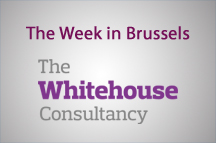
Transatlantic Trade and Investment Partnership
The European Parliament has been on a constituency week ahead of the summer recess, but this has not stopped MEPs holding forth on a range of issues. Scotland’s most senior MEP, David Martin, warned that the Transatlantic Trade and Investment Partnership (TTIP) deal with the United States might not be completed in the lifetime of the current European Parliament. Martin said the scale and complexity of the negotiations, along with an unprecedented public interest in trade policy which was being driven by campaign groups and NGOs, meant there would be no vote on TTIP until after 2019.
 Such a delay will be a disappointment to those who have championed TTIP as a way of boosting ties between the two trading blocs. However, TTIP has attracted criticism from the left and right on the grounds that it gives disproportionate power to international courts at the expense of national parliaments and governments.
Such a delay will be a disappointment to those who have championed TTIP as a way of boosting ties between the two trading blocs. However, TTIP has attracted criticism from the left and right on the grounds that it gives disproportionate power to international courts at the expense of national parliaments and governments.
Ukraine
On Wednesday, the European Commission announced that it had transferred 600 million euros to Ukraine as part of the third Macro-Financial Assistance Package, designed to stabilise the country’s balance of payments crisis through low interest loans and grants. Since the outbreak of the separatist conflict in early 2014, the Commission has provided almost 2 billion euros to Ukraine. However, further aid is dependent on structural reforms to its economy, which has been hampered by corruption and cronyism.
There was hope that the fighting might be closer to an end as the Kyiv government and pro-Russian rebels agreed on Tuesday to pull back heavy weapons in the east of the country. However, stability looks uncertain in the face of a far-right insurgency, which last week saw three people killed and 13 wounded when ultranationalist paramilitaries clashed with police in the western town of Mukachevo, near the border with Hungary.
Greece
If Member States have remained resolute in their willingness to support Ukraine, their patience is running thin with Greece. Polish Prime Minister Ewa Kopacz told a press conference that her country would “not pay a penny” from its own budget towards a new bailout, while Slovakian premier Robert Fico said he would call for Greece’s exit from the Eurozone if Athens failed to meet new conditions.
 Under proposals agreed by the Commission, Greece received a bridging loan of 7 billion euros on Monday to help repay its debts to the IMF and the European Central Bank and keep it solvent until discussions on a third bailout are concluded. In return, Greek Prime Minister Alexis Tsipras was forced to push through a range of unpopular measures on Wednesday, including restructuring of the banking sector and changes to civil judicial procedures and appointments. There was also a hike in VAT from 13% to 23% and an increase in the cost of public transport, both of which met with protest.
Under proposals agreed by the Commission, Greece received a bridging loan of 7 billion euros on Monday to help repay its debts to the IMF and the European Central Bank and keep it solvent until discussions on a third bailout are concluded. In return, Greek Prime Minister Alexis Tsipras was forced to push through a range of unpopular measures on Wednesday, including restructuring of the banking sector and changes to civil judicial procedures and appointments. There was also a hike in VAT from 13% to 23% and an increase in the cost of public transport, both of which met with protest.
These moves caused a split in the ruling Syriza party and made it through parliament only with the support of the opposition. However, there were signs that the financial markets were responding positively, as Standard & Poor’s said that it had updated Greece’s sovereign credit rating to CCC+ from CCC-.












